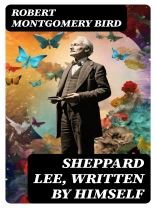In ‘Sheppard Lee, Written by Himself, ‘ Robert Montgomery Bird masterfully crafts a proto-American novel that melds humor, social critique, and a keen exploration of identity. The narrative follows Sheppard Lee, a disillusioned man who, through a series of comical and poignant reincarnations, navigates the complexities of 19th-century American society. Bird’s literary style intricately weaves satire with realism, reflecting the burgeoning American sensibility and its struggle with issues of selfhood, class, and aspiration. The book serves as a literary landmark, foreshadowing the themes that would later evolve in American realism and existential literature. Robert Montgomery Bird, an influential figure in early American literature, drew from his experiences as a physician and his observations of society to craft narratives that resonate with personal and national identity. His background in medicine and his involvement in the literary culture of his time provided a rich tapestry of insights into human nature, which he adeptly employed in his writing. Bird’s engagement with themes of transformation and social mobility in ‘Sheppard Lee’ reflects the cultural zeitgeist of an America at the cusp of modernization. I highly recommend ‘Sheppard Lee, Written by Himself’ to readers seeking a profound yet entertaining exploration of self and society. Bird’s unique approach offers a delightful engagement with the complexities of identity, making it a timeless classic that resonates even in contemporary discussions about the American experience and the nature of self-reinvention.
Про автора
Robert Montgomery Bird (1806–1854) was a multi-faceted American writer, dramatist, and novelist known for his contributions to American literature in the early 19th century. Born in New Castle, Delaware, he initially pursued a career in medicine after graduating from the University of Pennsylvania in 1827, but his passion for writing soon took precedence. Bird’s literary style is characterized by its embrace of the American Gothic tradition and its examination of the human condition through a unique blend of satire, humor, and social critique.
His novel ‘Sheppard Lee, Written by Himself’ (1836) is perhaps Bird’s most recognized work. This satirical narrative follows its eponymous protagonist through a series of extraordinary body-swapping adventures that reflect on the era’s culture and ethics. The novel’s innovative use of the first-person perspective and its exploration of identity and reincarnation were ahead of its time, presenting a precursor to many modern literary techniques. Bird’s work often highlighted the complexities of American society—including issues of identity, class, and the supernatural—placing him as a noteworthy figure in the antebellum literary scene. Despite his passing at an early age, Robert Montgomery Bird’s influence is enduring, with scholars continuing to study his nuanced depictions of American life and contributions to the development of the American novel.












